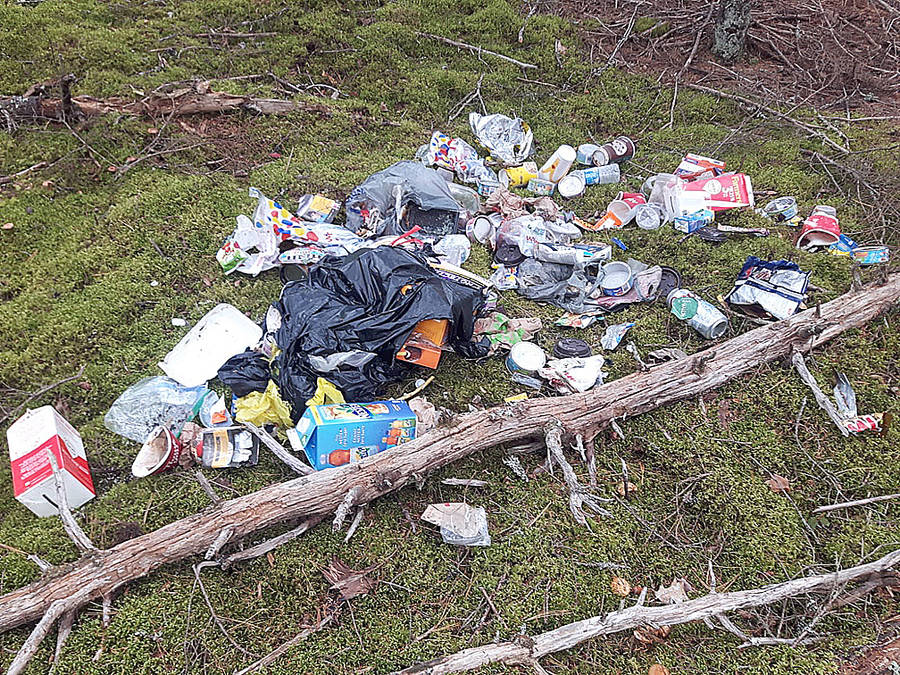
2021-05-19
Despite ongoing enforcement and strategies, people continuing to flout garbage laws
by KEVIN MCBAINLocal Journalism Initiative Reporter
Illegal dumping and littering continues to be an issue in Queens and Lunenburg Counties, despite the best efforts of enforcement and county officials.
"There is a marked increase in illegal dumpsites since the first of the year, as brought to our attention by resident complaints," reported Region of Queens Municipality (RQM) Mayor Darlene Norman in an email. "Having said that, our staff are members of Region 6 enforcement and our numbers are low based on what other municipal units are saying."
The Nova Scotia Region 6 Solid Waste Management area supports the solid waste efforts of the municipalities of the Region of Queens, Shelburne, Barrington, Lunenburg, Chester and Windsor/East Hants, as well as the towns of Mahone Bay, Lunenburg, Bridgewater, Lockeport, Shelburne and Clarke's Harbour.
Its staff are responsible for planning, training, audits, public awareness, management and enforcement concerning solid waste management in this area.
RQM has two staff members whose responsibility is to investigate dump sites and possible culprits.
The RQM's Waste Management Facility is located on Highway 8, about 15 minutes north of Liverpool.
According to Norman, a "rather large" historic dumpsite that has been used for years was recently discovered just 20 minutes away from the facility.
She pointed out that RQM provides plenty of opportunity for people to legally get rid of waste.
RQM residents are allowed four free dumps of any residential waste per year, and the hours at the waste management facility are set to offer ample time for residents to attend.
"It makes me question why anyone would choose to dump illegally when they can take it to our landfill," said the mayor. "The simple fact that such individuals have such little regard for our natural environment is disturbing," she added, noting that almost all the illegal dumping consists of residential garbage.
Commercial illegal dumping is more rare, with the last fine issued for commercial dumping 10 years ago. Some commercial waste is still happening at the grey boxes which is illegal, but law enforcement have had difficulty catching the perpetrators.
The large wooden-lidded boxes located at the end of private roads are to be used only for properly sorted garbage, recyclables and compost. Norman said quite often these areas are used instead as dumping grounds for furniture, car parts and construction debris. Contractors reportedly tend not to go down private roads, partly because for a good portion of the year some of the road standards are questionable.
Norman warned that RQM has no tolerance for illegal dumping, and those found guilty of it can be charged as much as $697.50 per incident.
In a phone conversation, the mayor suggested that much of the littering that is found on the road comes from the same people or families.
"It's often that you find the same type of pop can or alcohol beverage on the side of the road. It's the same local, habitual people that are doing it," she said, adding that it's "a learned habit.
"If a child is brought up in a family that just roll down their window and toss out their garbage, they will do the same."
While she says the region does its best to curb dumping and littering, there's still plenty of clean-up that needs to be done each year.
The region encourages people to report litterers as well as to do their part to clean things up in their community. Each year RQM sets aside money in its budget for a Community Litter Pick-Up Fund.
The fund is for non-profit community groups who can apply to pick-up roadside litter and get paid for it. Many use it as a fund-raising technique. The rate is $100 per kilometre for cleanup, on both sides of the highway, up to a maximum of three kilometres or $300.
RQM provides garbage bags, gloves and pickers. Eight groups have registered for this year so far, and there is room for more.
Municipality of the District of Lunenburg
Justin Cleveland, outreach and compliance officer for the Municipal Joint Services Board - Lunenburg Regional Recycling Centre, said his area is facing the same situation, or at least as far as dumping of renovation material is concerned.
"There has been quite a few people doing renovations and I assume they don't want to pay the tipping fees. There's been a lot of dumping of household shingles, old building and renovation materials," he said.
Most of the dumping occurs on the municipality's back roads.
Once a dumping location is identified, Cleveland attends the scene to try and find out who the offender is. This is followed up with an educational letter or, barring the pandemic, a visit, with the intention that the perpetrator will clean up the mess. A fine might also be issued.
On occasion, signage and cameras may be erected in trouble-spots to deter or catch the offenders in action.
However, according to Cleveland, general littering isn't a big problem in Lunenburg County.
"Obviously, you get the cups and the fast-food containers, but it hasn't been a huge issue," he said, adding that in most places residents keep things fairly neat and tidy, and at times people will take a garbage bag with them on their walks and pick up any litter they come across.
The municipality has a once-a-year incentive clean-up program similar to that in Queens.
Cleveland is working towards becoming a special constable, meaning that he will be able to investigate further and take offenders to court for their actions. COVID-19 has resulted in a delay in his ability to take the training needed.
The Lunenburg Regional Community Recycling Centre is currently closed to the public, but open to contractors. The closure will be re-assessed on May 28.






